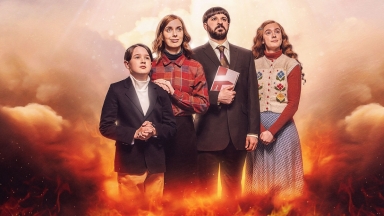
On the surface, Channel 4's cult-based comedy Everyone Else Burns might seem like a fairly run-of-the-mill jibe at people of faith. "Religious folk are weird." Hardly revolutionary stuff in 2023.
But look beneath the posters and there's a far deeper, more valuable exploration of human nature going on. Everyone Else Burns and, in a different way, the recent film Apostasy (2017), reflect on scared human beings trying to find a sense of purpose and stability in an uncertain world.
The family's religiosity gives them access to a community - in contrast to the stark loneliness of the secondary characters who make up their world.
David, the father in Everyone Else Burns, is clearly excellent at his job but, alas, sees no value in it whatsoever. Instead, his sense of self-worth is based on religious accomplishment. Compare that to the parable of the pharisee and tax collector in Luke 18 – how much true value does Jesus place on religious performance?
Fiona, the mother, is equally entrepreneurial – a contemporary picture of the industrious wife of noble character in Proverbs 31 – but her husband has no theology giving him cause to celebrate her accomplishments.
Their daughter, Rachel, wants to go to university, but her parents are afraid she'll be exposed to all manner of terrible things and either endanger herself or lose her faith. Aaron, their son, is an artistic genius, but is limited to explicit religious imagery. And yes, explicit in more than one sense.
The parents' desire to shelter their children from the scary world 'out there' (a noble aim) blinds them to the ways their family might be warping their children's ability to express themselves (a sad consequence).
Yes, truth and goodness matter. Yes, there are some fundamental rules for a life well lived. But we are each created unique, with unique skills, desires, and aspirations. 'Life in all its fullness' doesn't mean robotic religiosity – it means doing as Jesus would in every sphere of life, from work to study to creativity and beyond.
Ultimately, the family do love each other and want the best for each other. It's just that the rules they are living by are stifling the relationships they're living in. This isn't Christianity as Jesus taught it. It's not the gospel, it's the law. Everyone Else Burns gives a piercing critique of what it looks like 'if we do not have love' – if our yardstick for the good and godly life is box-ticking legalism.
Yes, religious folk can be weird. But contrary to what you might expect, Everyone Else Burns pokes at our compassion and suggests we shouldn't be too quick to sneer."
Tim Yearsley is Head of Innovation at the London Institute for Contemporary Christianity (LICC).













